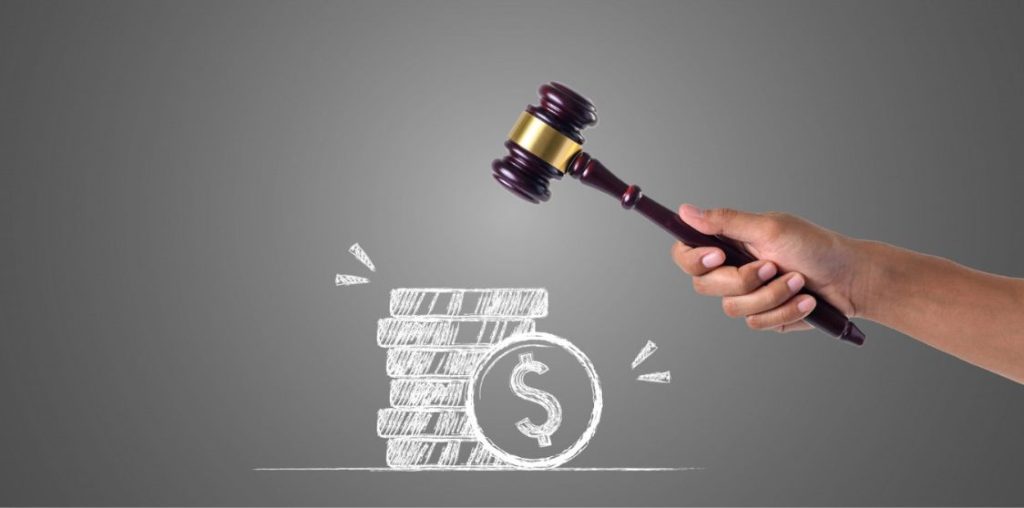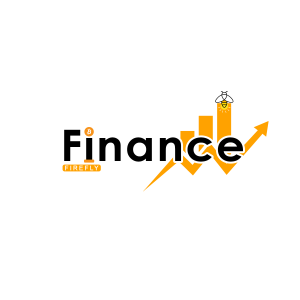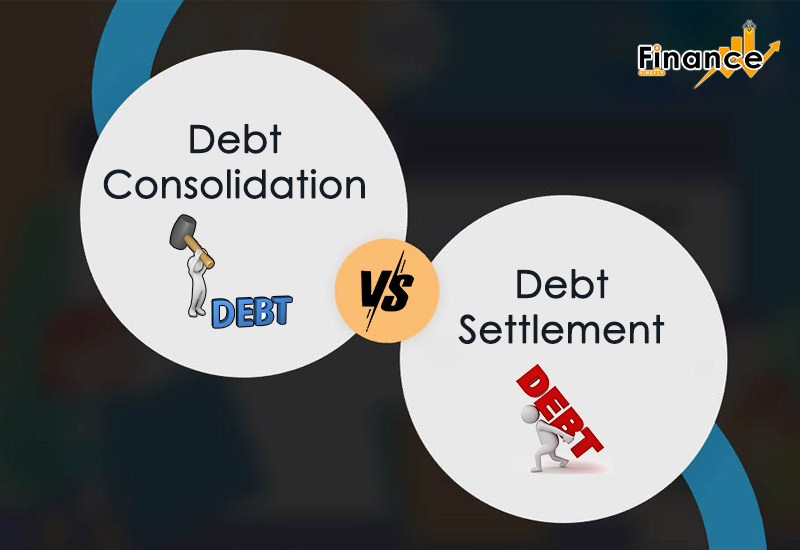Being an average American, you must be looking for ways to pay off your debt. There are numerous financial strategies to improve personal debt load but the two of the most debated options are debt consolidation vs debt settlement. The two popular debt pay-off strategies may sound similar but they resolve different issues.
If you don’t know the essential difference between the two terms debt consolidation vs debt settlement, then it can be more troublesome for you. Let’s dig deeper into the details of debt consolidation and debt settlement.
Table of Contents
Debt Consolidation vs Debt Settlement – Quick Summary
Debt consolidation refers as the way of combining one or more debts and paying them off in a single payment with favorable terms and conditions. Whereas, debt settlement is the way to renegotiate with the creditor on the terms and conditions so the creditor will be willing to accept less than what is owed.
When comparing debt consolidation vs debt settlement each approach comes with its own distinct set of benefits and drawbacks. With both of the strategies, you have to comprehend the basic details so that you will not be feeling the financial effects in the long term even if you have paid the debt.
Debt Consolidation vs Debt Settlement – Key Takeaways

Here are the points you need to consider:
- Debt consolidation and debt settlement are two effective ways to reduce the debt load but in different ways.
- When making comparisons of terms debt consolidation vs debt settlement, debt settlement reduces the overall debt owned, while debt consolidation reduces the total number of creditors whom you owe the debt
- Debt consolidation rolls multiple debts into a single payment with a low-interest rate
- In case of debt settlement either you or your credit counselor negotiates with the creditors to pay less debt than what you owe
What is Debt Consolidation?

Debt consolidation is the process of combining multiple debts into a single consolidation loan. This means that all prior debts are combined into one loan that is paid through a single account with low-interest charges. Consolidation loans are offered by numerous banks, credit unions and online lenders for the ease of all those who are buried under heavy debt.
Through Debt consolidation, you can streamline your finances by eliminating the hassle of juggling with multiple creditors. As all your payment is done by a single lender which potentially lessen your payment period.
How it works?
In order to consolidate debt you take a new loan either its personal loan or the balance transfer credit card and use the funds to pay off the debt. This means that you will make one monthly payment towards your consolidation loan.
No matter what of approach you use to consolidate debt there are different interest rates and repayment terms. For instance, if you use a personal loan to consolidate debt then you have to make fixed monthly payment with a duration of one to seven years depending upon your credit score and the lender you choose.
Why you would prefer it?
- To get a lower interest rate than those you are paying currently to save additional money and can help you pay off the debt in a quick and efficient manner
- To cut the number of payments you are struggling to keep tabs on
- When the amount of debt you are paying is manageable
Best ways to consolidate credit card debt
Personal Loan: For this type of loaning you need a good credit card history to pay off your debt. You don’t need a collaterallike house and car to secure this loan.To get the best interest rate, all you need is great credit, reliable income, and a lower debt-to-income ratio.
Balance transfer credit card: The best balance transfer credit card lets you move the existing credit card debtinto a newer account with comparativelylower interest charges. As you don’t have to put anything at stake, this is one of the most viable approaches to consolidating debt.
Home Equity line of credit (HELOC): With this type of loaning you get a lower interest rate but your home serves as collateral. In case you are unable to pay off debt you might lose your home.
401 (K) Loan: For this type of loan you won’t need a credit check to takelow interest loan. You are only borrowing money from the retirement savings account.
What is Debt Settlement?

Debt settlement is referred as the type of relief in which you negotiate with the creditor to lessen the debt you currently owe. Most Americans work with for-profit companies to perform the task for you. The key goal is to get the creditors to settle accounts for less than what is owed because some payments are better than no payments at all.
Trying to settle for the debts can be a tiresome and time-consuming process for you. However, if you work with a debt settlement company there will be a higher chance that creditors will settle for less amount.
How it works?
The process of working with debt settlement can be long but in the longer run its rewarding for you. As each company requires different agreements to get started therefore you might need the power of attorney, a new bank account, and cease contact with the creditors.
The debt settlement companies often use the smart approach and will collect the payment and settle it aside for a duration of 3 years. By withholding the payment of creditors, the company will make lump-sum settlement with the creditors. This one is a risky approach as the creditors will continue contacting you during that period. The negotiator will make an offer to the creditor to settle the debt less than what is owed.
Why you would prefer it?
- Through the debt settlement approach you would be able to pay off debt faster. Debt settlement often takes 1-3 years depending upon your financial conditions.
- Although a risky approach but at the same time its luck based too. As some creditors may accept the lump-sum with 50% of what you owe.
Negotiating Debt settlement
Although debt settlement is not an easy process here’s how you can go about settling debt :
- Save money to create an impressive offer – Set cash aside for 2 years and offer lump-sum payment to the creditor.
- Negotiate your payment: Contact your creditor directly and negotiate a settlement amount. It is advisable to avoid setting up new payment arrangements as they can lead to more credit damage.
- Ask the creditor to update the credit report: Ask the creditor to update your account status to “paid in full” on the credit report once they receive the full-fledge payment. This will help you in
- Request documentation: It is important to have written proof of the terms and conditions of your agreement. Just make sure that your settlement will be accepted as “payment in full”
- Send payments: It is important to send traceable forms of payments that are not linked to your personal account
Debt Consolidation vs Debt Settlement – Key differences
| Debt Consolidation vs Debt Settlement | Debt Consolidation | Debt Settlement |
| How it works | You take out a new loan to pay off all of your existing debts. This leaves you with one monthly payment, ideally with a lower interest rate and lower total monthly payment. | You negotiate with your creditors to settle your debts for less than what you owe. This is typically done through a debt settlement company, but you can also try to negotiate on your own. |
| Credit score impact | Debt consolidation will have a negative impact on your credit score in the short term, but it can help to improve your score in the long term if you make timely payments | Debt settlement will have a significant negative impact on your credit score, and it can take several years for your score to recover. |
| Cost | The cost of debt consolidation will vary depending on the interest rate and fees associated with your new loan. However, it is generally less expensive than debt settlement. | The cost of debt settlement will also vary, but it is typically a percentage of the debt you are able to settle. This can be a significant amount of money, especially if you have a lot of debt. |
| Pros | Can lower your monthly payments Can simplify your debt management Can improve your credit score in the long term | Can reduce the total amount of debt you owe * Can help you avoid bankruptcy |
| Cons | Can have a negative impact on your credit score in the short term May require a good credit score to qualify for a consolidation loan May not be the best option if you have a lot of debt | * Can have a significant negative impact on your credit score * Can be expensive * May not be successful in reducing the total amount you owe |
Debt Consolidation vs Debt Settlement – Which option should you prefer?
If you prefer the best ways to manage debts, then for sure you have to weigh the benefits of debt consolidation vs debt settlement. But for each use case one may be better than the other depeding on the financial situation
Debt Consolidation vs Debt Settlement: Pros
Advantages of Debt Consolidation
The bigger benefit of debt consolidation is that it can make life easier and less expensive by cutting various interest rates. As you have one payment to keep track of it can be worth consolidating for some borrowers. Moreover, you can easily extend the repayment terms when you consolidate debt and this likely reduce your monthly payments
Advantages of Debt Settlement
Debt Settlement can potentially reduce the amount of debt you owe, so you will keep more money in your pocket. In addition, you save a huge chunk of money to pay for the settlement that is lower than the balance you owe. Through this approach, you will be able to get rid of the loans faster. If the debt settlement agreement is successful for you then you can avoid bankruptcy.
The bottom line is that if you simply need a way to make your monthly payment more manageable then debt consolidation is the preferred choice. However, it is important to bear in mind that you will need a good credit card score in this case. But if you are currently behind the payments to pay one or more debts and have a higher chance that your creditors are threatening to sue then you should go for debt settlement. This can be less financially damaging than filing the bankruptcy protection.
Frequently Asked Questions
Will debt settlement have a negative impact on your credit?
Yes, debt settlement will hurt your credit because various settlement programs let you to stop making payments to creditors. The missed payments are directly reportedto the credit bureaus and therefore the credit score will decrease.
Which is more favorable approach for people with low credit score in between debt consolidation vs debt settlement?
Debt consolidation and settlement are useful financial strategies. But for people with low credit score debt settlement is the only choice. Furthermore, if debt consolidation vs debt settlement does not work bankruptcy is the last resort to manage debt.









